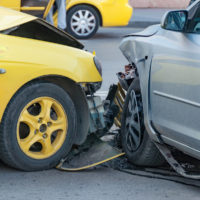How Often do Taxis Crash?

It’s an old but accurate joke that, in New York City, no one drives because there is too much traffic. The reason is the ubiquity of taxis, whether yellow cabs or town cars with medallions. New York taxi drivers also have a reputation for being particularly aggressive. We’ve all had the experience of being in the back of a cab and feeling the need to hold on as the driver squeezes between lanes or narrowly passes other drivers. Are taxis actually more dangerous than other cars on the road? What do the numbers show? Learn about the frequency of taxi crashes below, and contact a dedicated Orange County traffic accident lawyer if you or a loved one has been injured in a car accident in New York’s Hudson Valley.
Fatal or serious injury crashes involving licensed cab drivers
New York City’s Taxi and Limousine Commission (TLC) tracks licensed taxi driver crashes that involve death or serious injury. In 2018, TLC reported 40 fatal or critical injury crashes involving TLC-licensed drivers, down from 50 fatal or critical injury crashes in 2017. There were around 135,000 TLC-licensed vehicles on New York streets in 2018, meaning there were around 30 fatal or critical injury crashes per 100,000 TLC-licensed cabs. In contrast, according to data from the National Highway Traffic Safety Administration (NHTSA), there were around 10 fatal crashes per 100,000 registered passenger cars across the country. This suggests the rate of fatal crashes in NYC cabs is much higher than fatal passenger car crashes nationwide.
Taxi drivers who get in fatal accidents keep their licenses, return to work
According to the New York Post, more alarming than the sheer number of taxi cab crashes is the apparent lack of consequences for serious accidents. The TLC does not, as a policy, revoke taxi licenses just because a driver caused a fatal accident. The Post looked at 16 fatal or serious crashes involving taxis that occurred between 2009 and 2014 and found that all but two of the drivers involved kept their licenses and their medallions. Only two drivers had their licenses revoked, and even they were eligible to be reinstated in good standing after a waiting period, which could be as short as three years. The majority of taxi drivers who cause fatal accidents could be behind the wheel in a single day, as long as they were not charged with a crime, according to the TLC.
Factors that increase the rate of accidents, injuries
In addition to the total number of accidents, studies have looked at factors that affect the rate of accidents and the likelihood of injury. Researchers have found that passengers who do not wear seatbelts in taxis are twice as likely to suffer serious injury or death in an accident, and that taxi crashes are more likely to lead to injury than accidents involving other passenger cars. Researchers speculate that the partition in cabs might lead to more injury. Studies also connected time on the road to the likelihood of an accident, finding that drivers who are on the road for more than eight hours have a much slower response time. Further, driver inexperience is a major factor; new or part-time cab drivers were 5.5 times more likely to commit traffic violations than veteran, full-time drivers.
Experienced Car Accident Lawyers Can Help You
If you or a loved one has been injured or killed in a taxi accident or other car crash in New York, seek experienced legal help to evaluate your potential claims by contacting the seasoned and dedicated Poughkeepsie and Montgomery personal injury lawyers at the Law Office of Taran M. Provost, PLLC for a free consultation at 845-675-3243.
